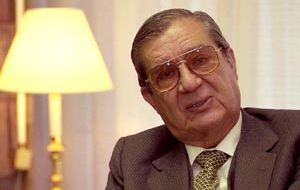MercoPress. South Atlantic News Agency
Chile was next target after Falklands in 1982, admits Argentine Brigadier
 Former Brigadier Basilio Lami Dozo revealed details of the Rosario operation
Former Brigadier Basilio Lami Dozo revealed details of the Rosario operation The last Argentine dictatorship headed by General Leopoldo Fortunato Galtieri had plans to attack Chile following the invasion and recovery of the disputed Falklands/Malvinas Islands in 1982 revealed on Sunday the former chief of the Argentine Air Force at the time, Brigadier Basilio Lami Dozo.
“Following Malvinas they had plans to attack Chile”, said the retired brigadier in an interview with Buenos Aires daily Perfil, who together with Galtieri and Admiral Leandro Anaya made up the military Junta that was forced to resign following the defeat in June 1982 to a British Task Force sent by ex Prime Minister Margaret Thatcher to recover the Islands.
Lami Dozo at all times during the interview talked in third person.
The Brigadier revealed that in 1982 when the conflict with Britain over the Falklands he personally requested the Chilean Air Force commander not to send aircraft with offensive capacity to the south of the country.
“He behaved quite well, not so the Chilean Navy and the Chilean Army which were decisively in favour of Great Britain”, said Lami Dozo.
He also mentioned that back in 1978 he was commissioned to personally negotiate with Chilean dictator Augusto Pinochet the border dispute over three islands in the Beagle Channel, extreme south of the South American continent, which had both countries on the verge of an armed conflict which was frozen at last moment, when tanks had begun rolling, by the direct intervention of then Pope John Paul II.
The Vatican mediation headed by Cardinal Antonio Samoré finally granted the three small uninhabited islands to Chile, a conclusion which was overwhelmingly accepted by the Argentine electorate in a referendum held in 1984, when Argentina had returned to democracy.
Lami Dozo insists that in the planned conflict with Chile he never gave the support of the Argentine Air Force to the belligerent position of the more radical “hawks” in the Army and Navy, and that his position all along had been to request the papal mediation.
“I wasn’t sure we could win. I told those in the Army that the Chilean armed forces would give us a tremendous blow at the beginning and could easily reach Rio Gallegos, Santa Cruz province. Obviously with time Argentina which is larger and stronger would force them back to the Andes. But yes, it was going to cost a lot of money and lives”, he underlined.
According to the original plan code named Rosario, following the capture of the Falklands and no reaction or limited reaction from Britain, the Argentine military would move to take control of the disputed islands in the Beagle Channel which cartographically are decisive for the access control to the Atlantic and Pacific oceans.
The fellow members of the Junta with Lami Dozo, General Galtieri and Admiral Anaya have both died. Anaya before being named by his peers to the Junta had been a naval attaché in London for several years where he had begun elaborating on the idea of taking the Falkland Islands by force.
General Galtieri as president of the Junta and in the middle of a political crisis and deteriorating economic situation bought the idea (having interpreted that Washington would look sideways in retribution for Argentina’s collaboration in fighting Communist regimes and guerrillas in Central America).
The rest of the events and the outcome of the 74-day conflict (April/June 1982) are all fresh history.




Top Comments
Disclaimer & comment rules-

-

-

Read all commentsWell, this isn't any surprise at all. It's well known that Chile was Argentinas target too. Before, during end even shortly after the Falkland wars. The Argentine Junta mentioned this in public during all this time since the Beagle conflict in 1977, and only after return of democracy in Argentina, in 1984 it ceased with it's wary attitude towards Chile. Therefore it seems very cynical to me, that Argentina cry's out “treason” when they refer to Chiles position during the Falkland war. Argentina itself provoked and motivated Chile to take part in the Falklands War, who did this for it's own security interest. “you harvest what you plant”
Nov 23rd, 2009 - 09:25 pm +1Brigadier Dozo was one of the three leaders of the Junta in 1982, the threat against Chile was well known and ill-guarded remarks caused Chile to re-inforce their land border. It was the Argentine Government that refused to accept the ICJ judgement in 1978 and then threatened war instead.
Nov 23rd, 2009 - 11:02 pm +1I have to agree with miriam. This is well-known story. Fortunatelly, It's all in the past. We had also 33 sovereignty disputes with chile that were solved during 90's in a peacefull way with dialogue, something others round there refuse to do. One of the too few things memem did well.
Nov 24th, 2009 - 02:43 am +1Nitro, if you allow me, chile did not give us patagonia. Patagonia wasn't chilean. They asked argentina not to intervene in the pacific war and in exchange they wouldn't intervene in the desert campaign. The rest is also a well-known story.
Cheers
Commenting for this story is now closed.
If you have a Facebook account, become a fan and comment on our Facebook Page!